Since its founding, The Fruit Republic has been striving to prevent and minimise the impact on the environment. The company is doing this at every step in the chain: from the fruit farm till final delivery at its customers.
Kể từ khi thành lập, The Fruit Republic đã nỗ lực ngăn ngừa và giảm thiểu tác động đến môi trường. Công ty đang thực hiện điều này ở mọi bước trong chuỗi: từ trang trại trái cây cho đến giao hàng cuối cùng cho khách hàng.
Fruit Farms
This process starts with carefully selecting the (smallholder) contract farmers. The fruit farmers need to be willing and motivated to comply with the highest international farming standards, in which environmental protection, responsible and a minimal use of agro-chemicals are important elements. After motivated farmers have been selected, they undergo an intensive training program to comply with the international farming standard named GlobalGAP.
Quá trình này bắt đầu bằng việc lựa chọn cẩn thận các nông dân hợp đồng (chủ sở hữu nhỏ). Người trồng trái cây cần sẵn sàng và có động lực tuân thủ các tiêu chuẩn canh tác quốc tế cao nhất, trong đó bảo vệ môi trường, có trách nhiệm và sử dụng tối thiểu hóa chất nông nghiệp là những yếu tố quan trọng. Sau khi những nông dân được lựa chọn, họ sẽ trải qua một chương trình đào tạo chuyên sâu để tuân thủ tiêu chuẩn canh tác quốc tế mang tên GlobalGAP.
An important part of this training is the focus on Integrated Pest Management, which aims to reduce the use of agro-chemicals. The Fruit Republic even goes a step further, by discouraging its contract farmers to use herbicides, and instead to offer them a premium for mechanical weeding and the use of cover crops. Farmers can only obtain this premium if they stop using herbicides. Over time farmers will see this improves the health of their soils, moisture content and results in better yields.
Một phần quan trọng của khóa đào tạo này là tập trung vào Quản lý dịch hại tổng hợp, nhằm mục đích giảm việc sử dụng hóa chất nông nghiệp. The Fruit Republic thậm chí còn tiến một bước xa hơn bằng cách không khuyến khích nông dân ký hợp đồng sử dụng thuốc diệt cỏ và thay vào đó cung cấp cho họ một khoản tiền thưởng cho việc làm cỏ cơ học và sử dụng cây che phủ. Nông dân chỉ có thể nhận được khoản tiền thưởng này nếu họ ngừng sử dụng thuốc diệt cỏ. Theo thời gian, nông dân sẽ thấy điều này cải thiện chất lượng đất, độ ẩm và mang lại năng suất tốt hơn.

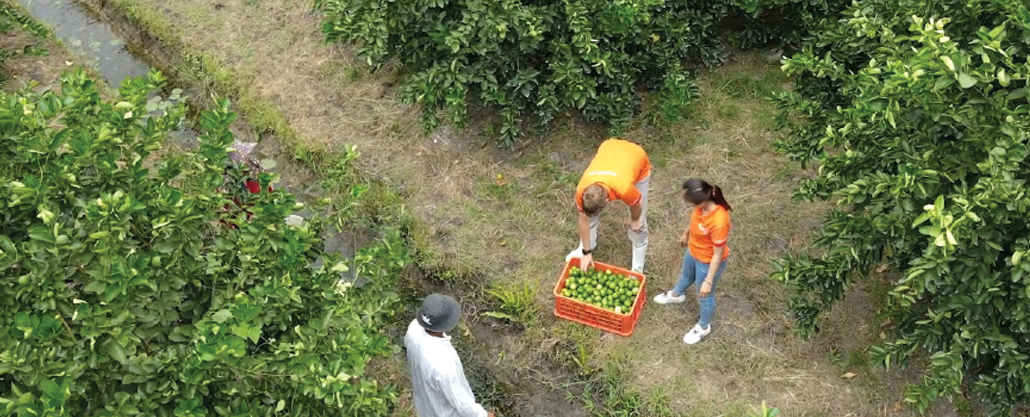
Packhouse
Within its own packhouse, The Fruit Republic, does not use any the post-harvest chemicals. This is quite unique, as in most fruit packhouses all around the world post chemicals are used against a wide range of fungus and rots. Within our packhouse and fresh cut facility we only use led lights in order to minimise electricity use.
In order to minimise the use of carbon based electricity to cool its large packhouse, we are developing a large rooftop solar panel project, so we can cool our fruits based on solar power.
Trong nhà đóng gói của riêng mình, The Fruit Republic, không sử dụng bất kỳ hóa chất sau thu hoạch nào. Điều này khá độc đáo, vì ở hầu hết các nhà đóng gói trái cây trên khắp thế giới sau khi xử lý hóa chất đều được sử dụng để chống lại nhiều loại nấm và thối. Trong nhà đóng gói và nhà tách múi, chúng tôi chỉ sử dụng đèn LED để giảm thiểu việc sử dụng điện.
Để giảm thiểu việc sử dụng điện dựa trên carbon để làm mát nhà đóng gói lớn, chúng tôi đang phát triển một dự án tấm pin mặt trời lớn trên mái nhà để chúng tôi có thể làm mát trái cây bằng năng lượng mặt trời.
Transport and distribution
For the transport of our fruit to the world market, we have selected to work with the shipping line which is the most ambitious in becoming carbon neutral by 2040 and has the most ambitious ship recycling goals. For every container which we send to the world, we pay an Environmental Fuel Fee (EFF). This surcharge is used offset the cost increase of operating vessels with cleaner fuels that have lower sulfur content (from 3.5% to 0.5%).
From January 1st 2024, the EU will introduce carbon pricing for shipping. This means that for every 1 ton of reported CO2, 1 European Union Allowance (EUA) must be purchased and submitted to the EU each year by the shipping lines. The cost of compliance is expected to be significant. It will be passed on to companies like The Fruit Republic in the form of a ‘Emissions Surcharge’ applied to all bookings on the voyage that will be subject to the EU ETS. The aim of this new regulation is to stimulate the use of renewable fuels in the future. We support this government imposed transition towards the use of green fuels by shipping lines.
Để vận chuyển trái cây của chúng tôi ra thị trường thế giới, chúng tôi đã chọn hợp tác với hãng tàu có tham vọng nhất trong việc trung hòa lượng carbon vào năm 2040 và có các mục tiêu tái chế tàu đầy tham vọng nhất. Đối với mỗi container mà chúng tôi gửi ra thế giới, chúng tôi phải trả Phí Nhiên liệu Môi trường (EFF). Khoản phụ phí này được sử dụng để bù đắp chi phí tăng lên của các tàu vận hành bằng nhiên liệu sạch hơn có hàm lượng lưu huỳnh thấp hơn (từ 3,5% xuống 0,5%).
Từ ngày 1 tháng 1 năm 2024, EU sẽ áp dụng định giá carbon cho vận chuyển. Điều này có nghĩa là cứ 1 tấn CO2 được báo cáo thì mỗi năm các hãng tàu phải mua và nộp 1 khoản Phụ cấp của Liên minh Châu Âu (EUA) cho EU. Chi phí tuân thủ dự kiến sẽ rất lớn. Khoản tiền này sẽ được chuyển cho các công ty như The Fruit Republic dưới hình thức 'Phụ phí phát thải' áp dụng cho tất cả các đặt chỗ trên chuyến đi tuân theo EU ETS. Mục đích của quy định mới này là nhằm khuyến khích việc sử dụng nhiên liệu tái tạo trong tương lai. Chúng tôi ủng hộ việc chính phủ áp đặt quá trình chuyển đổi theo hướng sử dụng nhiên liệu xanh của các hãng tàu.

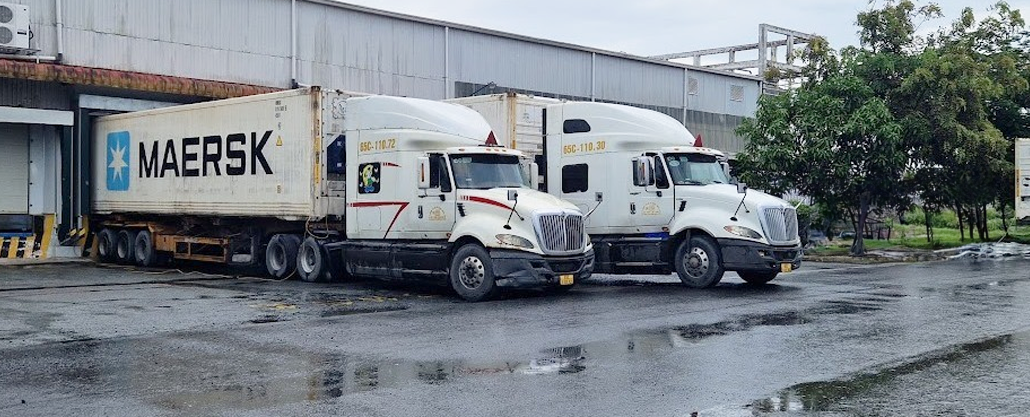
Compliance with the communication requirements of Vietnamese environmental regulations
The Fruit Republic is compliant with all required Vietnamese environmental regulations. These regulations cover topics such as wastewater treatment of packhouses, limits towards the creation of noise, management of garbage and various other topics. As part of these regulations, a company needs to publish these environmental certificates which it has achieved on its website in the Vietnamese. The aim of this regulation is that Vietnamese citizens can find and check that companies operating in Vietnam comply with the Vietnamese environmental regulations.
The Fruit Republic tuân thủ tất cả các quy định bắt buộc về môi trường của Việt Nam. Các quy định này bao gồm các chủ đề như xử lý nước thải của các nhà đóng gói, hạn chế tạo ra tiếng ồn, quản lý rác thải và nhiều chủ đề khác. Là một phần của các quy định này, công ty cần công bố các giấy chứng nhận môi trường mà công ty đã đạt được trên trang website của mình bằng tiếng Việt. Mục đích của quy định này là để công dân Việt Nam có thể tìm và kiểm tra những công ty hoạt động tại Việt Nam có tuân thủ các quy định về môi trường của Việt Nam hay không
The environmental certificate of The Fruit Republic can be found through this link:
Giấy chứng nhận môi trường của The Fruit Republic có thể được tìm thấy qua liên kết này:
In addition a company is required to publish its own environmental risk assessment, undertaken safety measures, action plan and emergency plan in the case an environment incidence would happen. This information (in Vietnamese) can be found through this link:
Ngoài ra, công ty phải công bố đánh giá rủi ro môi trường của mình, thực hiện các biện pháp an toàn, kế hoạch hành động và kế hoạch khẩn cấp trong trường hợp xảy ra sự cố môi trường. Thông tin này (bằng tiếng Việt) có thể được tìm thấy thông qua liên kết này:
Environmental incident response plan.
Kế hoạch ứng phó sự cố môi trường
The last communication requirement is the publication of the most recent two quarterly tests of the quality of the wastewater of a company.
Yêu cầu cuối cùng là công bố hai kết quả gần đây nhất về kiểm tra chất lượng nước thải của công ty.
These can be found though these links.
Kết quả kiểm tra có thể được tìm thấy qua những liên kết sau:
Quarter 1, 2022 Quí 1, 2022
Quarter 2, 2022 Quí 2, 2022
Quarter 3, 2022 Quí 3, 2022
Quarter 4, 2022 Quí 4, 2022
Quarter 1, 2023 Quí 1, 2023
Quarter 2, 2023 Quí 2, 2023
Quarter 3, 2023 Quí 3, 2023
Quarter 4, 2023 Quí 4, 2023
Quarter 1, 2024 Quí 1, 2024
Quarter 2, 2024 Quí 2, 2024
Quarter 3, 2024 Quí 3, 2024
Quarter 4, 2024 Quí 4, 2024
Quarter 1, 2025 Quí 1, 2025
Quarter 2, 2025 Quí 2, 2025
Since its foundation in 2009, The Fruit Republic (TFR) has developed into the leading fresh produce exporter of Vietnam. In a period of five years, The Fruit Republic has successfully developed the world’s only year-round supply program of GLOBALGAP certified pomelo, seedless limes and dragon fruit. TFR is also the first company to supply certified organic lime from Asia. More and more supermarket chains in Europe and Asia are switching to this year-round concept of weekly arrivals of top quality produce from Vietnam.
All our fruit and vegetables are sourced from our own GAP certified contract farmers. TFR has a large professional team of agronomists and QA staff, who work on a daily basis with our contract farmers to support them to improve their farm management and to assure they comply with strict international quality standards.
We hold both GLOBALGAP and HACCP certifications, abide by the social standards of the Ethical Trade Initiative (ETI), and are certified for ETI compliance for our contract farmers as well as for our staff working in our processing facilities. In the past two years, TFR has used its experience to supply high value markets in Europe with top quality fresh produce, to
develop a successful fresh produce portfolio of over 100 different fruit and vegetables products for the domestic market. Like for its export markets, all products are sourced from TFR’s own certified contract farmers and its growing acreage of corporate farms.
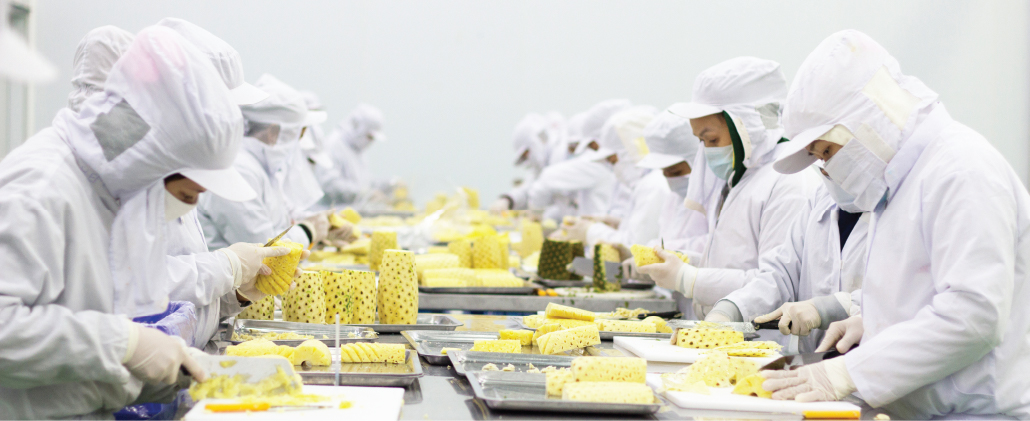
The Fruit Republic was established by a strong team of Dutch and Vietnamese fresh produce professionals who have worked together for over ten years in the agriculture sector of Vietnam. Together they developed an innovative contract farming system that includes hundreds of smallholder farmers and established two modern HACCP certified processing facilities in two distinct agro-climatic zones, each with a unique sourcing area: the tropical Mekong Delta and the temperate highlands of Dalat.
Since we started we have changed the face of the Vietnamese fruit and vegetable sector and have achieved international recognition for our consistently high quality produce, reliable supply programs and professional staff. On both the international and domestic market we are successfully building strong consumer brands from Vietnam.

The Mekong Delta is a lush landscape of green orchards with vibrant villages crisscrossed by small canals and streams fed by the mighty Mekong River. This fertile delta plain nourishes the year-round cultivation of our delicious range of tropical fruits and vegetables.
The Fruit Republic operates the first temperature controlled pack-house and fresh cut facility in Vietnam. This 4,000 m2 large HACCP-certified packing facility is located in Can Tho, in the heart of the Mekong Delta and is surrounded by more than 350,000 hectares of tropical fruits and vegetables. The facility has several washing, sorting and grading and packaging lines, enabling us to handle large volumes of produce, well calibrated for size and color.
In our 750 m2 high-care fresh cut room, 75 well-trained staff prepare a wide range of fresh-cut fruit. Besides fresh-cut honey pomelos and pink pomelos, we offer fresh cut pineapples, mangos, jack fruit and a growing number of other fresh cut fruits.
We are now the leading supplier of fresh cut produce to supermarkets, professional food service companies, international airlines and a growing number of multinationals in Vietnam, which include our fresh cut produce in their staff’s wellness programs.
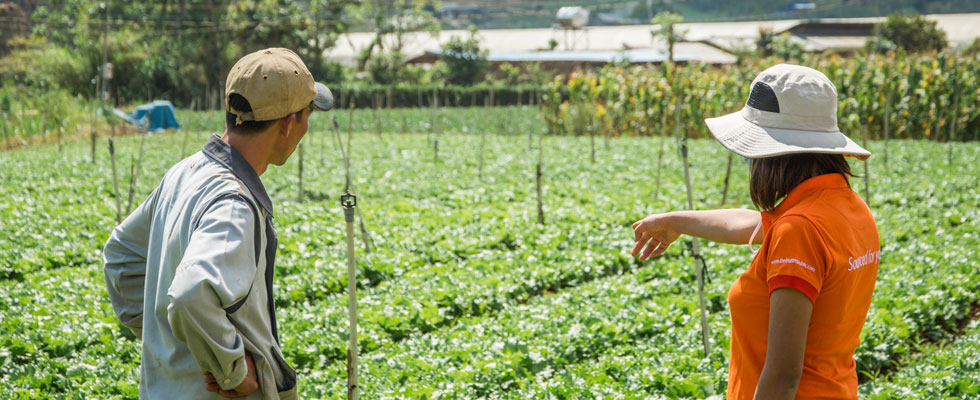
The highlands of Dalat are a unique fresh produce production area in Southeast Asia. Located on a fertile plateau at an altitude between 1,000 and 1,600 meters above sea level, Dalat offers the perfect conditions for year-round production of a wide range of vegetables, herbs and temperate fruits. With an average temperature of 25 degrees Celsius during the day and a night temperature of 15 degrees, fresh produce from Dalat is famous for its crispness and good taste.
In the middle of this 30,000 hectares large highland production area, The Fruit Republic operates a 2,000 m2 large HACCP-certified packing facility. Our success in the export market formed the basis to develop a fresh produce portfolio for the domestic market. By applying the same international quality standards, we have been able to develop the leading fresh produce brand for the Vietnamese market.
Our contract farmers are located within short range of our facility, so that after harvesting, the produce enters the cold chain as fast as possible. Every day we source over 100 different products from Dalat, which we supply nationwide to modern retail and professional food service customers through our strong distribution network.
In addition to our vast domestic presence we pack iceberg lettuce, sweet pepper, beef tomato, fresh herbs, button mushrooms, cabbages and sweet pepper for export throughout Asia and the Middle East.
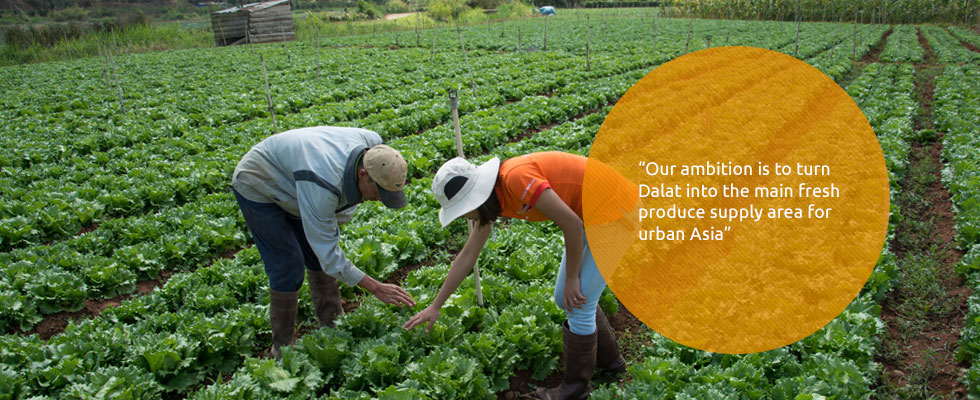
We are committed to offer both our international and our domestic customers reliable supply programs of fresh fruit and vegetables that meet stringent international food safety and quality standards.
We hold both GLOBALGAP and HACCP certifications, abide by the social standards of the Ethical Trade Initiative (ETI), and are certified for ETI compliance for our contract farmers as well as for our staff working in our processing facilities.
Our love for fruits and vegetables combined with our strong consumer and market insights allow us to develop innovative fresh products that are relevant for purchase by different types of customer groups.
The Vietnamese have a fantastic food culture, in which herbs, vegetables and fruits play a crucial role. The vegetable consumption already starts at breakfast with the delicious pho and continues with lunch and dinner.
It is no surprise that the Vietnamese have one of the highest vegetable consumption figures per capita in the world. Also fruits play a very important role in the Vietnamese culture. Fruits are consumed after lunch and dinner and during work breaks in the morning and afternoon. Fruits are also used as gifts, offered in temples and at family altars at home, in respect for the forefathers.
Unfortunately food safety issues for a wide range of products in Vietnam (meat, noodles, soy sauce, fruit, vegetables), have made consumers very concerned about food safety. As for most products it is not known where they are produced, how and by whom, the Vietnamese consumer feels very insecure how to feed their families with healthy and safe food. To give back to our community, we decided it is our responsibility to develop a fresh produce portfolio for the domestic market, so that Vietnamese families can enjoy ‘home-grown’ fruit and vegetables without having to worry about food safety.
We have developed a portfolio of over 100 different fruit and vegetable products, which are sold under our brand: Mekostar. Every day we supply these products nationwide to supermarkets and professional food service customers and smaller produce shops through our strong distribution network.
Each product is fully traceable to the farm where it was produced and all farmers are closely monitored by our team of agronomists and quality assurance staff.
Right from the start we have been working hard to make our fruits special and different from the rest. We started by exporting the Vietnamese pomelo, which until we started, was unknown on the world market.
Most sold pomelo’s in Europe and Asia were being supplied by China, Thailand and a small volume came from Israel. What made our product different, was the taste (more juicy and more flavor) and our ability to supply our pomelo year-round, meeting the highest international standards.
After the successful introduction of our pomelo, we developed a second unique product: a year-round program of untreated seedless lime. Again we were able to make a distinction in the market, our limes are very juicy, have a nice deep green colour and are untreated after the harvest. This means that our untreated limes are not waxed and no post-harvest fungicides are used. This makes our limes the perfect ingredient for food and drinks.
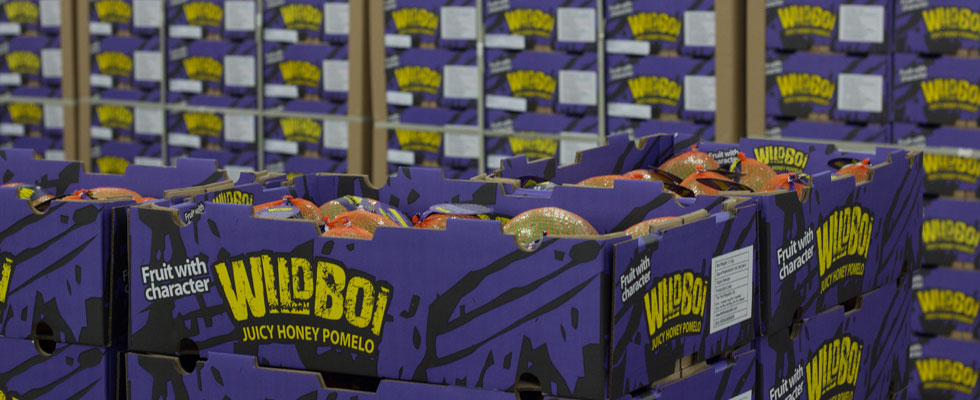
Our products are available in leading supermarket chains across Europe, Asia and the Middle East. We work with world class importers and distribution companies, with whom we develop long term relations for regular supply programs.
Through our dedicated cold store and logistic service provider in the Netherlands, we are also able to serve customers in Western Europe on a per pallet basis. For most customers we have weekly arrivals of containers by sea, 52 weeks per year, in various harbors around the world.
For our range of fresh cut products, herbs and exotics with shorter shelf life, we have developed regular air freight shipment programs. We are using special insulated thermal covers for our pallets to assure that our products are well protected from temperature shocks during transit. We monitor this carefully with temperature data-loggers on every shipment.
The Vietnamese have a fantastic food culture, in which herbs, vegetables and fruits play a crucial role. The vegetable consumption already starts at breakfast with the delicious pho and continues with lunch and dinner.
It is no surprise that the Vietnamese have one of the highest vegetable consumption figures per capita in the world. Also fruits play a very important role in the Vietnamese culture. Fruits are consumed after lunch and dinner and during work breaks in the morning and afternoon. Fruits are also used as gifts, offered in temples and at family altars at home, in respect for the forefathers.
Unfortunately food safety issues for a wide range of products in Vietnam (meat, noodles, soy sauce, fruit, vegetables), have made consumers very concerned about food safety. As for most products it is not known where they are produced, how and by whom, the Vietnamese consumer feels very insecure how to feed their families with healthy and safe food. To give back to our community, we decided it is our responsibility to develop a fresh produce portfolio for the domestic market, so that Vietnamese families can enjoy ‘home-grown’ fruit and vegetables without having to worry about food safety.
We have developed a portfolio of over 100 different fruit and vegetable products, which are sold under our brand: Mekostar. Every day we supply these products nationwide to supermarkets and professional food service customers and smaller produce shops through our strong distribution network.
Each product is fully traceable to the farm where it was produced and all farmers are closely monitored by our team of agronomists and quality assurance staff.
Right from the start we have been working hard to make our fruits special and different from the rest. We started by exporting the Vietnamese pomelo, which until we started, was unknown on the world market.
Most sold pomelo’s in Europe and Asia were being supplied by China, Thailand and a small volume came from Israel. What made our product different, was the taste (more juicy and more flavor) and our ability to supply our pomelo year-round, meeting the highest international standards.
After the successful introduction of our pomelo, we developed a second unique product: a year-round program of untreated seedless lime. Again we were able to make a distinction in the market, our limes are very juicy, have a nice deep green colour and are untreated after the harvest. This means that our untreated limes are not waxed and no post-harvest fungicides are used. This makes our limes the perfect ingredient for food and drinks.

Our products are available in leading supermarket chains across Europe, Asia and the Middle East. We work with world class importers and distribution companies, with whom we develop long term relations for regular supply programs.
Through our dedicated cold store and logistic service provider in the Netherlands, we are also able to serve customers in Western Europe on a per pallet basis. For most customers we have weekly arrivals of containers by sea, 52 weeks per year, in various harbors around the world.
For our range of fresh cut products, herbs and exotics with shorter shelf life, we have developed regular air freight shipment programs. We are using special insulated thermal covers for our pallets to assure that our products are well protected from temperature shocks during transit. We monitor this carefully with temperature data-loggers on every shipment.